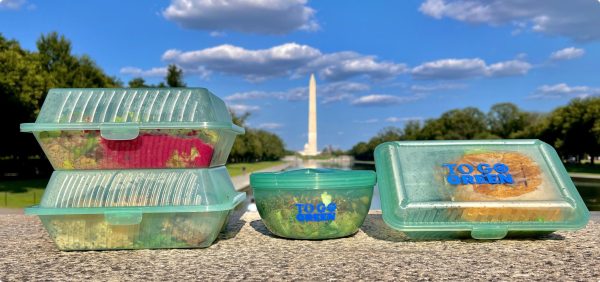This past August, a Georgetown University Law Center graduate and his brother launched To Go Green, an eco-friendly takeout service that aims to revolutionize the restaurant industry by introducing reusable containers that customers can return to restaurant partners after their meal.
Kevin Kay (LAW ’20) and Harrison Kay’s company partnered with 13 restaurants to encourage the Washington, D.C. community to build a closed-loop consumption cycle and help restaurants reduce costs associated with single-use plastics. To Go Green came to fruition after the company received a grant from the D.C. Department of Energy and Environment, the D.C. mayor’s office and the Chesapeake Bay Trust, a nonprofit organization dedicated to improving the watershed of the Chesapeake Bay.
Kevin Kay said inspiration struck during the pandemic when the brothers — who are vegan — became increasingly frustrated by the amount of single-use waste their takeout orders were creating.
“During the pandemic, many D.C. restaurants were closed for dining, and Harison and I were ordering a lot of takeout. But we’re vegan so we try to be conscious about our environmental impact, and we became very frustrated with how much single-use waste our takeout orders were creating,” Kevin Kay told The Hoya. “So we’re starting to brainstorm a solution to that problem, which is a problem that we discovered many other D.C residents were facing.”

Leah Karrer, executive director of the Waste & Resources Action Programme, a global environmental action nongovernmental organization and one of To Go Green’s customers, said To Go Green is a unique solution to waste problems.
“Using To Go Green is easy and incredibly straightforward,” Karrer told The Hoya. “What I love about it is that they’re very innovative. They’re a local, real-world solution to what is a massive, global problem of overproduction, unsustainable consumption and extensive waste.”
To place a takeout order, customers visit To Go Green’s website and select a meal from a partner restaurant. The food is packaged in reusable containers that can withstand up to 1,000 uses. Customers have three weeks to return the container, either by scheduling a pickup or dropping it off at the restaurant.
Kevin Kay said To Go Green uses Uber Direct, a local delivery platform for businesses, to connect customers with restaurants, but it hopes to involve other delivery companies such as DoorDash or GrubHub in the future.
“We have not integrated their containers into the larger online ordering platforms like Doordash or Grubhub, although that is certainly a goal for us in the future in order to offer our reusable containers to a broader audience,” Kevin Kay told The Hoya.
To Go Green earns a profit by charging a commission on each order and charging restaurants on a per-use basis for containers. Their containers, manufactured by G.E.T. Enterprises — the same company that manufactures containers at Leo J. O’Donovan Dining Hall at Georgetown University — are durable, microwave-safe and BPA-free.
Lela Singh, retail manager of Teaism, one of To Go Green’s restaurant partners, said Teaism had been considering the switch to reusable containers for many years, but did not believe it was something they had the bandwidth to do until To Go Green facilitated the operations.
“I love that they could solve an issue for us,” Singh told The Hoya. “We can’t manage the inventory of reusable containers, but through their app, they can. It is a huge admin burden off a small business. And also, the To Go Green container price for us is actually less than a lot of the disposable containers we use.”
Kevin Kay said “Business and Financial Basics for Lawyers,” a business course at Georgetown Law, inspired him to consider entrepreneurship as a career, instead of criminal law, which he studied originally.
“It’s funny how things work out because when I was a 3L in law school I took a class called ‘Business Basics for Lawyers’ to have an easier semester,” Kevin Kay told The Hoya. “I should have been paying a lot more attention in that class.”
“Even though I focused on criminal law, just having a law degree from Georgetown has been helpful because legal skills can be useful for things like creating partnership agreements,” Kevin Kay added.
Karrer said it is essential that businesses can profit from sustainable efforts to guarantee environmental conservation.
“In order for us to have a sustainable planet, we need businesses to be making money off sustainable practices,” Karrer said. “And that’s what I envision for To Go Green, that it will be a self-sustaining business.”